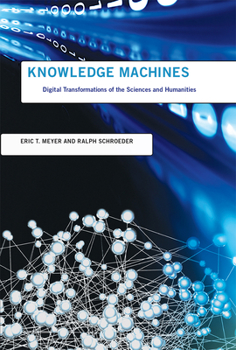Knowledge Machines: Digital Transformations of the Sciences and Humanities
(Part of the Infrastructures Series)
Select Format
Select Condition 
Book Overview
An examination of the ways that digital and networked technologies have fundamentally changed research practices in disciplines from astronomy to literary analysis. In Knowledge Machines , Eric Meyer and Ralph Schroeder argue that digital technologies have fundamentally changed research practices in the sciences, social sciences, and humanities. Meyer and Schroeder show that digital tools and data, used collectively and in distributed mode-which they term e-research -have transformed not just the consumption of knowledge but also the production of knowledge. Digital technologies for research are reshaping how knowledge advances in disciplines that range from physics to literary analysis. Meyer and Schroeder map the rise of digital research and offer case studies from many fields, including biomedicine, social science uses of the Web, astronomy, and large-scale textual analysis in the humanities. They consider such topics as the challenges of sharing research data and of big data approaches, disciplinary differences and new forms of interdisciplinary collaboration, the shifting boundaries between researchers and their publics, and the ways that digital tools promote openness in science. This book considers the transformations of research from a number of perspectives, drawing especially on the sociology of science and technology and social informatics. It shows that the use of digital tools and data is not just a technical issue; it affects research practices, collaboration models, publishing choices, and even the kinds of research and research questions scholars choose to pursue. Knowledge Machines examines the nature and implications of these transformations for scholarly research.
Format:Paperback
Language:English
ISBN:0262547856
ISBN13:9780262547857
Release Date:May 2023
Publisher:MIT Press
Length:288 Pages
Weight:0.92 lbs.
Dimensions:0.6" x 6.0" x 9.0"
Age Range:18 years and up
Grade Range:Postsecondary and higher
Customer Reviews
0 rating





